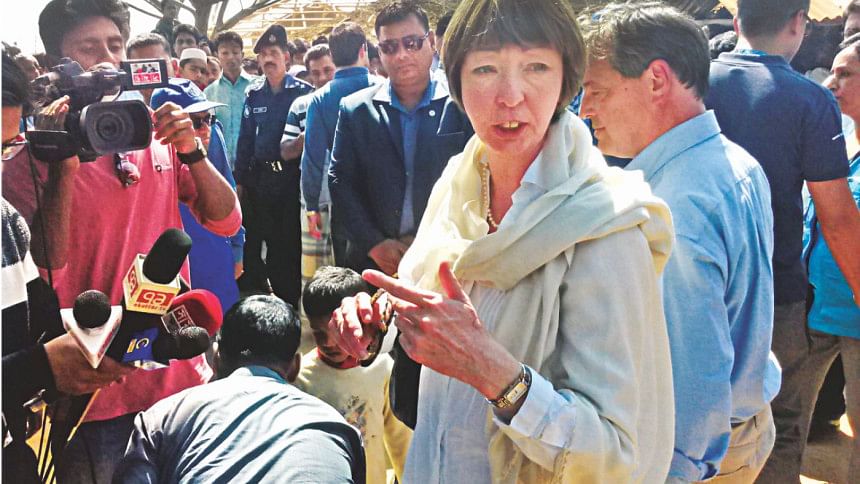Rohingya Crisis: Int'l initiative needs to be strengthened

Hearing from Rohingya refugees the description of torture they suffered at the hands of Myanmar army, three foreign envoys in Bangladesh yesterday stressed the need for stronger international initiative for reinstatement of their citizenship and their safe return to homeland.
The Rohingyas, who had fled to Bangladesh in the face of persecution in Myanmar, narrated their harrowing experience when the high commissioners of the UK, Canada and Australia paid a two-day visit to Cox's Bazar from Wednesday.
Alison Blake of the UK, Benoît-Pierre Laramée of Canada and Julia Niblett of Australia visited an official Rohingya refugee camp and a makeshift settlement at Kutupalong in Ukhia upazila during the trip jointly arranged by the International Organisation for Migration (IOM) and World Food Programme (WFP).
In another development, Bangladesh government's Taskforce on Rohingya sat at the foreign ministry yesterday with Foreign Secretary Md Shahidul Haque in the chair and discussed the latest status of the ongoing head counting of Rohingya population in Cox's Bazar.
According to foreign ministry sources, the Myanmar authorities have sought a list of the Rohingyas who fled Myanmar and took shelter in Bangladesh since October 9 last year.
Amid international pressure, the Myanmar side hinted at repatriation of the newly arrived 69,000 Rohingyas, the sources added.
Myanmar's nationality law, approved in 1982, denies Rohingya citizenship and states that foreigners cannot be naturalised citizens of Myanmar unless they can prove a close familial connection to the country.
Rohingyas are not recognised among the 134 official ethnicities in Myanmar because authorities see them as illegal immigrants from neighbouring Bangladesh.
Talking to local journalists after visiting the unregistered Rohingya slum, locally called “Rohingya Tal”, the envoys stressed the need for strengthening international initiative to solve the Rohingya crisis. They also lauded Bangladesh government for sheltering the persecuted Rohingya people.
The British envoy said: “Hearing the description of the torture from Rohingyas who fled Rakhine state in Myanmar, it seemed that it is tantamount to genocide.
“The initiative the international community has taken to repatriate these Myanmar citizens need to be strengthened. The UK will play a significant role in the humanitarian initiative.”
The Canadian high commissioner echoed his British colleague's views and said, “Bangladesh government has done a good job by sheltering these people. The role of the government in upholding human rights is praised. Working for human rights of these people is also an urgent task now”.
The Australian envoy said: “Stronger international initiative is required to ensure that Rohingyas can return to their homeland and do not become victim to torture.”
The three high commissioners reached the Kutupalong slum by road around 10:00am. They stayed there for about two and a half hours. They spoke with Rohingya men and women through an interpreter. They wanted to know from the Rohingyas what type of torture they faced in Myanmar.
In reply, the Rohingyas described in details the tortures, attacks, rapes, killings, forced disappearances and burning of their homes.
At present, about 90,000 Rohingyas -- both old and newly arrived -- are living in the slum. According to local authorities, around 50,000 had long been living there. Another 40,000 arrived there after the violence erupted in Rakhine on October 9 last year.
Later, the high commissioners went to a registered Rohingya camp and visited a school there. They enquired about the system of educating children at the school and talked to Md Shamsuddoha, who is in charge of the camp.
The envoys wanted to know the present conditions of the registered Rohingyas in the camp and enquired about different ongoing development projects. They stayed there for about one and a half hours.
About 13,000 registered Rohingyas are now living in the camp, established in 1991.
Earlier around 9:30am, the envoys visited Ukhia Upazila Health complex and later ACF Hospital adjacent to Kutupalong refugee camp.
On return from the visit, the Canadian High Commission announced a fund of $49,920 to support the newly arrived Rohingyas. The contribution was made to a local NGO called Society for Health Extension and Development (SHED) which will distribute blankets to among the Rohingya refugee families in two main makeshift settlements.
This is the first time direct funding is provided to a local NGO by Canada in Cox's Bazar to help build and strengthen local capacity, said a press release yesterday.
Canada is also providing $30,000 through the Canadian Red Cross Society to an emergency relief assistance operation for the newly arrived Rohingya refugees.
These contributions are in addition to Canada's ongoing support of $250,000 to UNHCR that contributed to increased access to basic services and protection for refugees, and Canada's $250,000 support to WFP for the provision of food and nutrition assistance to Rohingya refugees living in Cox's Bazar.

 For all latest news, follow The Daily Star's Google News channel.
For all latest news, follow The Daily Star's Google News channel. 



Comments